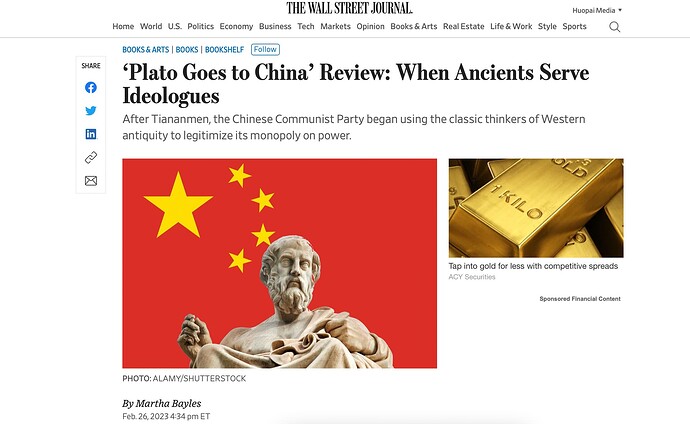-
《 中国的柏拉图》追溯了中国人接受古希腊和罗马政治哲学的历史。
-
该书的作者沙迪-巴茨赫探讨了自天安门民主运动以来西方经典在中国的用途。
-
该书的分析因作者对宗教的不严肃态度和对主要故事的有限视角而受到阻碍。
-
Bartsch女士讲述了中国共产党如何开始利用西方经典思想家来使其对权力的垄断合法化,她把Leo Strauss塑造成故事中的恶棍。
-
在施特劳斯授课之前,中国的西方经典著作一直是民主事业的燃料。之后,支持政权的学者指出,柏拉图对民主的批判是诋毁西方普遍价值观的一种方式。
-
然而,Bartsch女士的分析是有缺陷的,因为柏拉图对民主的批判就在表面上,而不是被包裹在言语中。
-
作者没有区分对柏拉图的两种解释:第一种,更多是尼采式的解释,认为高贵的谎言是一种烟幕,第二种,更传统的解释,认为它是一种善意的尝试,根据政治的偶然性和人性的不完美来调整道德秩序。
-
Bartsch女士采用了那些批评家的观点,他们认为施特劳斯是一个政治机会主义者,出于愤世嫉俗的动机误读了古代文献。
-
作者引用了许多令人震惊的无耻谎言,这些谎言是由中国的意识形态战士编造出来的,他们从柏拉图和其他经典作家那里翻找证据碎片,证明古代西方智慧与现代理想直接对立。
-
这种 "思想改革 "的真正前身是列宁和斯大林在布尔什维克革命后开发的精神控制技术,然后被希特勒和中国的国民党政府采用,最后被毛泽东磨练得非常完美。
-
一个更广泛的视角可能会照亮21世纪的中国正在成为一个没有人,甚至是哲学家,可以对权力说真话的地方的更深层原因。
-
“Plato Goes to China” traces the history of the Chinese reception of ancient Greek and Roman political philosophy.
-
The author of the book, Shadi Bartsch, explores the uses made of Western classics in China since the Tiananmen Square pro-democracy movement.
-
The book’s analysis is hindered by the author’s unserious attitude toward religion and limited perspective on the main story.
-
Ms. Bartsch relates how the Chinese Communist Party began using classic Western thinkers to legitimize its monopoly on power, and she casts Leo Strauss as the villain of the tale.
-
Prior to Straussian teaching, the Western classics in China had been fuel for democracy’s cause. Afterward, pro-regime scholars pointed to Plato’s critique of democracy as a way of discrediting Western values in general.
-
However, Ms. Bartsch’s analysis is flawed because Plato’s critique of democracy is right on the surface and not swaddled in verbiage.
-
The author fails to distinguish between two interpretations of Plato: the first, more Nietzschean one sees the noble lie as a smokescreen, and the second, more traditional one sees it as a good-faith attempt to adjust the moral order to the contingencies of politics and the imperfections of human nature.
-
Ms. Bartsch adopts the perspective of those critics who view Strauss as a political opportunist who misread ancient texts for cynical motives.
-
The author quotes many egregiously ignoble lies churned out by ideological warriors in China who rummage through Plato and other classic authors for scraps of evidence that ancient Western wisdom stands in direct opposition to modern ideals.
-
The true antecedents of this “thought reform” are the mind-control techniques developed by Lenin and Stalin after the Bolshevik Revolution, then adopted by Hitler and the Nationalist government in China before being honed by Mao to demoniacal perfection.
-
A broader perspective might have illuminated the deeper reasons why 21st-century China is becoming a place where no one, not even the philosopher, can speak truth to power.
链接:‘Plato Goes to China’ Review: When Ancients Serve Ideologues - WSJ
